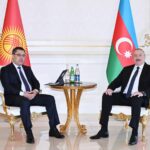General assessment
The human rights situation in Armenia remains deplorable. Restrictions related to the COVID-19 pandemic and last year’s hostilities have aggravated the human rights situation in the country, resulting in abuse of power by the authorities and violations of the constitutional freedoms of Armenian citizens. Violations of freedom of expression and peaceful assembly, domestic violence, discrimination against persons with disabilities, discrimination based on sexual orientation and gender identity—all this, coupled with the consequences of the pandemic and the protracted political crisis after the 44-day war with Azerbaijan, has adversely affected the current situation in Armenia.
Problems such as corruption and lack of transparency, use of disproportionate force by law enforcement officers, and harsh prison conditions remain relevant, despite minor improvements. The Freedom in the World 2021 Index puts Armenia among “partly free” countries.
The country’s politics was destabilized in 2020, while fears concerning the political rights and civil liberties of the people persist. According to the Nations in Transit report published by Freedom House, Armenia is a semi-consolidated authoritarian regime with 33 points on a 0-100 scale (where 0 equals least democratic and 100 equals most democratic) with mediocre politics, a polarized society, and a lack of an independent judiciary. In this regard, there are prerequisites for serious concerns about the establishment of democracy in the country. The public is largely distrustful of the judicial system.
According to the US Department of State report, the following violations have been recorded in Armenia: trafficking in persons, arbitrary interference with privacy, lack of judicial independence, crimes involving violence or threats of violence targeting civil society figures, harsh and potentially life-threatening prison conditions, use of the worst forms of child labor.
According to the 2020 EU Annual Report on Human Rights and Democracy, some of the areas in which further improvements are necessary include curbing discrimination and hate speech, gender equality and preventing gender-based violence, prosecution of torture and ill-treatment, and the regulation of pre-trial detention.
Freedom of expression
According to the US Department of State report, during the first month of the state of emergency introduced to curb the COVID-19 pandemic, the government imposed a number of restrictions on media, setting administrative fines for posting or publishing information on the pandemic that did not reflect reports from official government sources. Police officers visited the editorial offices of various media outlets, forcing them to remove certain articles under threat of fines. These actions of the Armenian government were criticized by such organizations as the Organization for Security and Cooperation in Europe (OSCE) and Reporters Without Borders, who did not welcome such restrictions on freedom of expression and did not agree that these measures were effective in combatting the pandemic.
The authorities also restricted freedom of expression under the martial law. In October 2020, the parliament approved the bill banning the publication of “unofficial information” about the conflict and any criticism of military actions and statements by government officials. Media outlets in general lacked diversity of political opinion and objective reporting, mainly presenting news from a progovernment standpoint. On several occasions independent media experts expressed concern about cases of bias on public television, which was the source of news for the majority of Armenian citizens.
There were a number of cases of abuse of power by police and government officials against journalists in 2020. In the second quarter of 2020, the local NGO Committee to Protect Freedom of Expression reported that six media representatives had been injured as a result of the violence used against them. The police also tried to interfere with the work of reporters covering the political protest against the ceasefire between Azerbaijan and Armenia. Police intimidation was used against media representatives affiliated with the former government of Armenia. According to the CPFE, the number of cases of violence against journalists rose to 7, with 8 victims, in the first quarter of 2021. This indisputable fact reflects extreme intolerance and poor relations between the government and the media.
Freedom House reports that in March 2021, the National Assembly of Armenia adopted amendments to triple the maximum punishment for insult and libel. These amendments were passed without consulting the Ministry of Justice or the Ombudsman’s Office and were criticized by civil society, as well as by the Director for Europe and Eurasia programs at Freedom House.
The new amendments contradict the requirement to maintain a fair balance between freedom of expression and the right to respect for private life in the context of publications (intimate aspects of an individual’s life and reputation), as per the European Convention on Human Rights. They also contradict the 2011 Resolution 997 of the Constitutional Court of Armenia that strongly urges to take into account the financial situation of the media outlet when imposing fines in cases of libel and insults.
Use of disproportionate force by the police, torture and inhuman treatment
While the Armenian Criminal Code defines and criminalizes torture, it does not criminalize other cruel, inhuman, and degrading treatment. The report of the Helsinki Citizens Assembly-Vanadzor mentions eight complaints from citizens alleging police subjected them to degrading treatment, torture, or physical and psychological violence. This was revealed in two months of the state of emergency introduced during the pandemic (March 16 to May 16, 2020). There were also reports of abuse in police stations, which, unlike prisons and police detention facilities, were not subject to public monitoring.
Despite several allegations of abuse of power, the government remained silent about any arrests linked to the alleged violations as of the end of 2020. Human Rights Watch said that investigations into past incidents of abuse by law enforcement agencies were considered incomplete. The investigation into police brutality during the 2016 protests resumed in 2019, but no formal charges were filed.
Prison and detention center conditions
Harsh prison conditions, including appalling sanitation, poor medical care and theft by hierarchical criminal structures, continued to exist in Armenia in 2020. The Prison Monitoring Group (PMG), a coalition of local NGOs, raised concerns about life-threatening conditions in some prisons, but these and other problems remain relevant. According to PMG, there have been no significant improvements in detention center conditions since the start of prison renovations in 2019.
According to the US Department of State report, the Ombudsman’s Office and the PMG continued to note the need for better psychological services in prisons. The shortage of psychologists on staff has led to numerous cases of self-harm and suicide in prison cells. Prisoners who try to commit suicide are often punished by prison staff instead of getting proper medical and psychological care. Several human rights organizations pointed out that sexual minorities (bisexual, transgender, homosexual, lesbian) continue to experience the worst prison conditions. LGBT persons or those assumed to be LGBT, or those associating with them are often sent to solitary confinement, where they are subjected to humiliating attacks and heinous insults from prison staff.
Freedoms of assembly and association
Although freedom of assembly is legally guaranteed in Armenia, the opposite is true in reality: in 2020, the restrictions related to the COVID-19 pandemic and the war further reduced the citizens’ freedom of assembly to a minimum. For example, martial law, which was not lifted in November 2020 after the signing of the ceasefire statement, introduced a law to ban antigovernment rallies demanding the resignation of the prime minister. During the state of emergency, police did not intervene in some protests, while gatherings of fewer than five people, including single protests, were stopped even when protesters wore face masks and maintained social distancing.
Interestingly, according to a report of the International Federation for Human Rights (FIDH), the arbitrary arrests of several environmental activists in 2020 were quite alarming. In the past several years, environmental rights defenders have been holding a blockade against the construction of a gold mine by Lydian Armenia CJSC in Amulsar. During a series of peaceful protests in August 2020, police illegally arrested dozens of people who demanded the protection of the environment in Amulsar. The Observatory for the Protection of Human Rights Defenders expressed concern over the situation and urged the government to guarantee the protesters’ rights, including their right to assembly.
Human rights defenders
Individual human rights defenders are subjected to various attacks and threats, including threats of physical elimination. There have been a number of attacks on the offices of human rights defenders and NGO members, as well as hate speech addressed to them. The intimidation also came from online trolls affiliated with media outlets, and nationalist groups. In general, the government did not take decisive action in response to the attacks on human rights defenders. As a result of hate campaigns, increasing numbers of academics and other opinion makers became reluctant to voice their opinions in public. The authorities have taken no effective measures to prevent the increasing marginalization of civil society actors (other than criminalizing public calls for violence).
On top of it, a number of officials and members of parliament gave inappropriate comments, which further exacerbated the situation.
Racism, discrimination, intolerance
Discrimination against ethnic minorities and disadvantaged groups remains one of the most pressing human rights issues. In 2020, antisemitic tendencies in Armenian society intensified because Israel showed support for Azerbaijan in the conflict. While some antisemitic comments had appeared in Armenian social media even earlier, never being condemned by the authorities, their number and intensity increased during the large-scale hostilities between Azerbaijan and Armenia in the fall 2020, and the Holocaust and Genocide Memorial was vandalized twice.
Corruption and lack of transparency
The government’s new anti-corruption strategy for 2019-2022, published in December 2018, was drafted in an incompetent and non-transparent manner. Armenia has a legacy of systemic corruption in many areas, including construction, mining, public administration, parliament, the judiciary, procurement practices, and provision of state assistance.
According to the Prosecutor General’s Office, as of June 30, law enforcement bodies and tax services uncovered violations estimated to have caused 129 billion drams (almost $267 million) in damages to the state as a result of embezzlement, abuse of power, illicit enrichment, and bribery. Of this amount, 25 billon drams ($52 million) was to be paid to the state budget, but NGOs continued to raise concerns regarding insufficient transparency in this process.
Children’s rights
According to the US Department of State report, there are a numerous children’s rights issues in Armenia, including lack of access to education, abuse, child marriage, sexual abuse, child trafficking, and the use of the worst forms of labor.
Children from disadvantaged communities and children with disabilities are disproportionately affected by lack of opportunities for preschool education. Only slightly more than half of children between the ages of three and five benefit from preschool education, with far fewer in rural areas. Enrollment and attendance rates for children from ethnic minority groups, in particular Yezidis, Kurds, and Molokans, are significantly lower than average. Minority languages are not taught as part of the formal academic curriculum, and in the few schools that do offer unregulated minority language classes at all, parents complain that these classes do not adhere to any standards and are largely ineffective.
Physical and psychological violence against boys and girls is widespread in Armenia; it is even one of the disciplinary methods of its state policy. Two-thirds of sex crimes are committed against minors, but experts say that the real picture is even worse, since the strong stigma around such violence in the country leads to nonreporting by victims and their families. Although the legal minimum age for marriage is 18, early marriage of girls is widespread, especially in rural communities, with the result that many girls never complete their secondary education. The government does not take measures to address the practice of child marriage.
Women’s rights and domestic violence
Armenia ranks 98th out of 153 countries on the World Economic Forum’s Global Gender Gap Index (2020), based on indicators such as economic participation and opportunity, education, health, survival, and political empowerment.
Women remained underrepresented in leadership positions in all branches and at all levels of government. According to the UN Women report, as of 2019, there was only one female mayor among 46 urban communities of Armenia and only 1 of the 52 heads of the consolidated municipalities was a woman.
The already alarming domestic violence situation in Armenia was exacerbated by the COVID-19-related restrictions. The authorities investigated 395 criminal cases in the first half of 2020. The number of calls to the hotline of the Women’s Support Center in June 2020 increased twice compared with the same period last year.
Moreover, some female victims of domestic violence may not have been able to seek help due to social isolation.
Observers believe sexual harassment of women in the workplace and the political arena was not adequately addressed by the government.
There were reports that police were reluctant to act in cases of sexual and domestic violence.
The ratio of boys and girls at birth in 2019 was 110 to 100. According to women’s rights groups, this is due to sex-selective practices as part of a broader problem of gender inequality in Armenia.
Translated from Caliber.Az
Aze.Media










